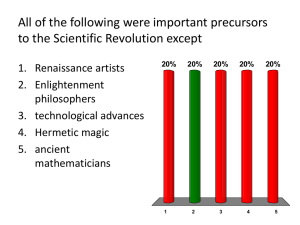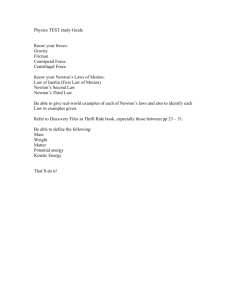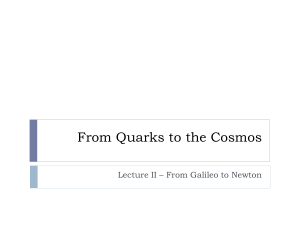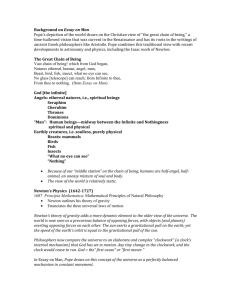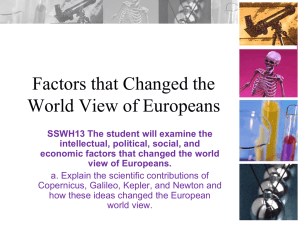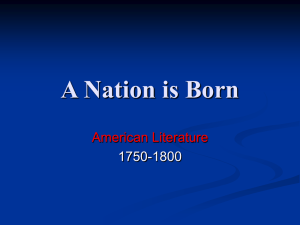Ch 6 The Scientific. Rev
advertisement
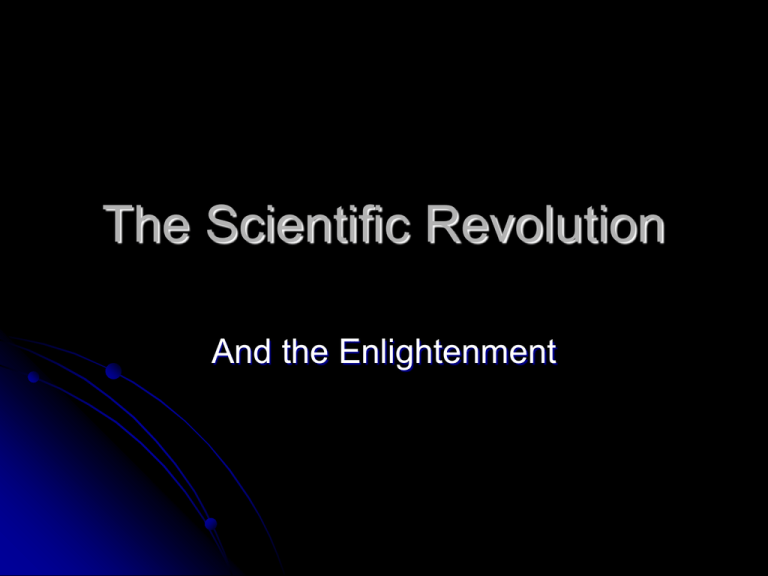
The Scientific Revolution And the Enlightenment The Geocentric View of the Universe Old Assumptions Medieval philosophers accepted a geocentric view that held that the earth was a motionless body located at the center of the universe. The sun, moon, and planets all moved around the earth in perfect circular paths. Old assumptions Medieval philosophers believed that different physical laws applied to the earth and to the heavens. Traditional authorities Both the Greek philosopher Aristotle and the Alexandrian astronomer Ptolemy supported the geocentric theory The Church taught that God had deliberately placed the earth at the center of the universe. Earth was thus a special place on which the great drama of life took place. The Heliocentric View of the Universe Nicolas Copernicus 1473-1543 A polish clergyman and astronomer. Directly challenge the geocentric view in his book On the Revolutions of the Heavenly Bodies. Copernicus presented the heliocentric view in which the earth revolved around the sun, which was the center of the universe. Johannes Kepler 1571-1630 Copernicus’s ideas were based on logic and not direct observation. In the late 1500’s, Danish astronomer, Tycho Brahe, recorded the movements of each known planet. After Brahe died in 1601, Kepler continued the work. After carefully studying Brahe’s data, Kepler formulated three laws of planetary motion: The planets revolve around the sun in elliptical orbits Planets move more rapidly as their orbits approach the sun The time a planet takes to orbit the sun varies proportionately with its distance from the sun Galileo Galilei 1564-1642 An Italian scientist who used controlled experiments to formulate laws of motion and inertia that were expressed in mathematical formulas He was one of the first people to use the telescope for astronomical observation. His discoveries provided irrefutable support for the heliocentric view. Pope Urban VII accused Galileo of meddling “with the most important and dangerous subjects which can be stirred up in these days” In 1633, the pope summoned Galileo to Rome to stand trial. Under threat torture, Galileo retracted his support for the Copernican theory. The Scientific Method Sir Francis Method 1561-1626 and the Inductive contributed to scientific developments in the 17th century by advocating an inductive method for scientific experimentation The inductive method begins with direct observation of phenomena. This produces data that is systematically recorded and organized. The data leads to a tentative hypothesis that is retested in additional experiments. argued that this process of controlled experimentation would lead to the formulation of universal principles and scientific laws. The New business of Paradigms Part 1 of 2 Excellence in Supply Chain Management Conference by APTUS - YouTube Rene Descartes 1596-1650 and the Development of the Deductive Method Contributed to scientific developments in the 17th Began by doubting all notions based on authority or custom. Instead, he started with a self-evident axiom known to be true. He then used logical reasoning to deduce various inferences Characteristics of the Scientific Method ‘s inductive and Descartes deductive methods proved to be complementary part of a systematic and logical way of seeking truth known as the scientific method. The scientific method includes the following: Belief in the existence of regular patterns in nature Use of controlled experiments to systematically record facts and verify hypotheses Search for mathematical formulas to describe natural phenomena Scientific Societies Sponsored by governments and monarchs, scientists organized societies to promote research and spread scientific knowledge. Founded in 1660, the Royal Society in England enjoyed international prestige. Other scientific societies were founded in Florence, Paris and Berlin. Such societies helped to create an international scientific community. Sir Isaac Newton 1642-1727 Newton and the law of Gravitation Newton published the Principia in 1687. This momentous work combined Kepler’s laws of planetary motion, Galileo’s laws of inertia and falling bodies, and Newton’s own conception of gravitation into a single mathematical law of Universal Gravitation. Newton’s concise mathematical formula described all forms of celestial and terrestrial motion. Horrible Histories - Royal Society of Scientist - YouTube The Newtonian Universe Newton demonstrated that the universe is governed by universal laws that can be expressed in mathematical formulas. Newton viewed the universe as a vast machine, created by God but working according to universal laws that could be discovered, mastered and utilized to improve human life. Supernatural and miraculous forces played no role in Newton’s universe. Newton’s mechanistic concept of the universe dominated Western thought until discoveries of Albert Einstein in the early 20th century. Test Tip The Scientific Revolution is one of the watershed events in European intellectual history. AP Euro test writers do not expect you to memorize scientific laws or mathematical formulas. They do expect you to discuss how pivotal figures such as Galileo, , Descartes and Newton adopted a new view of nature that challenged long-held views of the relationship between humanity and the universe. The Enlightenment The Philosophes The philosophes were a group of thinkers and writers who espoused enlightened ideas. Taken together, they formed a grand “republic of letters”. The philosophes were not abstract philosophers. Instead, they dedicated themselves top exposing social problems and proposing reforms based upon implementing natural laws Although many leading philosophes were French, they were a cosmopolitan group who could be found in the American colonies and across Europe. Key Ideas Reason was the absence of intolerance, bigotry, and superstition. Reason meant informed thinking about social problems. Humans should rely on reason, not miracles, to improve society. Nature and natural laws regulate both the universe and human society These laws can be discovered by human reason Key Ideas continued… Happiness, philosophes had little interest in the medieval belief that people should accept misery in this world to find salvation in the hereafter. Believed that happiness in this world was an inalienable human right. Progress, philosohes were the first to believe in social progress. Key Ideas continued… The discovery of laws of economics and government would improve society and make progress inevitable. Liberty, philosophes lived in societies that placed restrictions on speech, religion, and trade. They wanted to remove these limitations on human liberty. Believed that intellectual freedom was a natural right. Without freedom of expression there could be no progress. Deism Deists thought of God as a cosmic watchmaker who created the universe and then let it run according to immutable natural laws Much of the educated elite in western Europe and America embraced deism. However, deism’s reliance upon reason and its lack of emotion had little appeal for many people. A new religious movement known as pietism stressed faith, emotion and religion of the heart. Voltaire 1694-1778 Prince of the Philosophes Was the best known and most influential philosophe. He was a prolific writer who popularized Newton’s scientific discoveries, criticized France’s rigid government, and denounced religious bigotry. “Crush the Infamous Thing” Voltaire directed his most stinging barbs at the intolerance of organized Christianity, both Protestant and Catholic. He championed religious tolerance. He often ended his letters with the passionate demand to “ecrasez l’ infame” (crush the infamous thing). This ringing exclamation reminded his readers to continue the battelk against the enemies of reason --- bigotry, ignorance and religious fanaticism Denis Diderot 1713-1784 and the Encyclopedia Purpose Diderot was a French philosophe who became the chief editor of the Encyclopedia. Diderot’s goal was to bring together all the most current and enlightened thinking about science, technology, mathematics, art and government. “All things must be examined, debated, investigated without exception and without regard for anyone's feelings.” Importance The encyclopedia disseminated enlightened thinking across Europe and North America. It undermined established authority by including articles about controversial political and religious subjects. Who was it that said Faith and Reason can co-exist? Baron de Montesquieu 1689-1755 The Spirit of the Laws Was a French nobleman and attorney who wanted to limit the abuses of royal absolutism. The Spirit of the Laws represented an attempt to create a “social science” by applying the methods of natural sciences to the study of government. Separation of Powers He concluded that the ideal government separated powers among executive, legislative and judicial branches. This system of divided authority would protect the rights of individuals by preventing one branch from gaining unrestricted control over the entire society. His ideas had significant influence on the writers of the American Constitution Jean-Jacques Rousseau 1712-1778 Natural Education Presented ideas of education in a novel called Emile Natural education should replace the rigid form of education. Key forms of natural ed: Children are naturally good and are entitled to an education the emphasizes freedom and happiness People develop in stages, education must be individualized since “every mind has its own form” Children should be allowed to draw their own conclusions. This is discovery education today. The General Will The Social Contract, Rousseau’s treatise on politics and government, is one of the most influential books on political theory in European history. Hobbes and Locke argued that individuals entered a social contract with their rulers. In contrast, Rousseau argued that individuals entered into a social contract with one another. This created a community or organized civil society. The sovereign power in a state does not lie in a ruler. Instead, it relies in the general will of community as a whole. The general will or “public spirit” is defined as any action that is right and good for all. Rulers are servants of the community. If they fail to carry out the peoples will, they should be removed. Rousseau’s concept of the general will and the sovereignty of the people influenced leaders of both the French and American revolutions. It is also important to note that twentieth-century dictators justified their rule by claiming to embody their nations general will. Rousseau and the Enlightenment Like other philosophes, Rousseau was committed to defending individual freedom and changing the existing social order. However, he distrusted reason and science. He trusted emotions and spontaneous feeling more than cold logic. As a result, he foreshadowed the romantic reaction to the Enlightenment. Test Tip: Textbooks contain long lists devoted to discussing the contributions of leading philosophes. Voltaire and Rousseau generate by far the most questions. Be sure you know that Voltaire supported religious toleration and opposed superstition and ignorance. Test items on Rousseau stress his concept of the general will and his views of education as presented in the novel Emile The New Economics The French Physiocrats French economic reformers called physiocrats were first to question mercantilist principles Led by Francois Quesnay, the physiocrats argued that economic activities should be freed from artificial restrictions. Governments should follow a laissez-faire policy of noninterference with the economy Adam Smith 1723-1790 Was the most influential advocate of of laissez-faire economics Like Newton, he combined the thought of his predecessors into a single system based upon the study and application of natural laws. Published in 1776, The wealth of Nations is a land mark book that gave birth to classical economic thought. Key Ideas in The wealth of Nations Governments must not interfere with the free functioning of markets Governments should limit their role to defending the state against foreign invasion, protecting property and enforcing contracts In a free market, the economic laws of supply and demand will create a self-regulating economic system Regulations such as tariffs hinder free trade and should be abolished. Self interest and the invisible hand, Smith maintained that every individual is motivated by self-interest. Competition and self-interest are socially beneficial: Self-interest drives people to action and the Invisible hand of competition acts as an automatic regulator so that the market will generate wealth for a nation. Making comparisons: The economic policies of Jean Baptiste Colbert and Adam Smith Colbert Believed that mercantilist policies offered the best way to increase French power and wealth Followed economic policies designed to give France a favorable balance of trade. Colbert promoted Caribbean sugar plantations, established slaving stations in Africa, and encouraged colonies in Canada aye Subsidized French industry by granting monopolies and enforcing high tariffs Adam Smith Urged governments to abandon regulatory policies such as tariffs, trading monopolies and navigation acts Advocated a policy of free trade and minimal government interference in the economy Believed that self-interested individuals working in a free market would increase production and wealth
